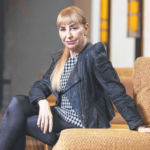New hope for Alzheimers as scientist prepares for drug trials

LONDON: British Baroness Susan Greenfield is talking to high net worth investors in Australia about
bringing her therapy to treat Alzheimer’s to the stage where it can be trialled on humans.
The baroness is the founder and chief executive of Neuro-Bio and last month had her paper on a new type of drug, known as NBP14, peer reviewed in the Alzheimer’s & Dementia TRCI.
“The drug will halt Alzheimer’s, I hope,” she said, adding that her research had reached a point of accelerated learning. “It’s a bit like a jigsaw puzzle. Once you complete more of the puzzle then things start getting quicker.”
Alzheimer’s is a growing and heartbreaking problem in countries with ageing populations. Treatments for the drug are expected to cost $13.3bn by 2023.
Baroness Greenfield, a former Oxford lecturer in medicine and researcher in the Department of Pharmacology, believes current treatments for Alzheimer’s are too focused on the consequences of neurodegeneration such as amyloid plaques, at which point too much damage has already been done. “The problem with this is you are closing the door after the horse has already bolted,” she added.
Her next step is raising up to £20m ($34.9m) for Neuro-Bio to take the drug from mice trials, where it’s shown promising results, to Phase 1 clinical trials.
Australia is a good place to start her “friend raising” campaign ahead of the fundraising because about 20 per cent of Neuro-Bio investors come from this country.“Everyone has an interest in Alzheimer’s … Austra-lians are perhaps more open-minded,” she said.
One seed investor is Peter Yates, who is currently the chairman of AIA Australia and director of Mutual Trust. Others are rumoured to include former Macquarie Bank chief executive Nicolas Moore and the Myer family.
Mr Yates has known Baroness Greenfield since she was the “thinker in residence” at Adelaide’s Australian Science Media Centre, set up to counter inaccurate reporting of science.
“Susan came up with a novel therapy for Alzheimer’s and when she did early fundraising I was an early investor,” said Mr Yates.
Fundraising to date has gotten her drug to the point of peer review publishing. The new funds she is hoping to raise take it through to trials on humans in a year or two years’ time.
“With venture capital, at this stage you decide where you want to be, and you explain your idea so that people who might want to invest have time to think about it,” Mr Yates said of her visit.
Neuro-Bio’s drug NBP14 is among the first to be accredited with formal recognition by the British Medicines and Healthcare products Regulatory Agency as truly novel.The drug focuses on a previously unknown neurochemical that Neuro-Bio believes underlies a basic biologicalsystem.
“We have designed a new type of drug, NBP14, that is actually a structurally changed, inactive variant of T14 itself, that blocks the actions of its naturally occurring counterpart when operating inappropriately,” Neuro-Bio said in a statement.
According to their own research, optimal pricing for the drug would be $10 per day.
“Five years post-launch, we forecast over 650 million treatments per year in our target markets, with an anticipated net revenue per treatment of ~£7.50,” Neuro-Bio said. “This results in annual sales of ~£5bn in the fifth year following launch.” The second part of Baroness Greenfield’s research involves creating a saliva or blood test to test for the chemical compound that she believes indicates Alzheimer’s.
- Baroness Susan Greenfield.







